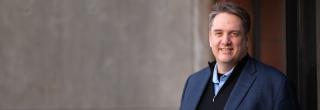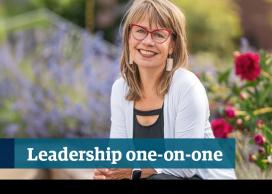Brad Wuetherick is the Associate Provost, Academic Programs, Teaching and Learning at UBC Okanagan. In this role, he focuses on creating an inclusive, anti-racist teaching and learning environment and educational pathways for student success.
Taking a non-traditional path into academic leadership, Brad began his career as an elected student leader, centering students as partners to imagine the future of teaching and learning. He is an internationally-recognized scholar of teaching and learning in higher education, and is a fellow with the US-based Gardner Institute for Excellence in Undergraduate Education.
For the past 20 years, Brad has served in a variety of leadership roles in teaching and learning, undergraduate student affairs, continuing education, and undergraduate research. Of Métis and European ancestry, Brad brings a unique perspective to UBC’s leadership team.
Q1. What quality do you most admire in a leader?
BW: I’ve always admired leaders who have a vision for bringing people together to create a better world. I admire their ability to take a big picture goal to inspire and mobilize people to tackle society's big questions and challenges. When I see this in leaders who are doing it well, they manage to balance compassion with empowerment, really listening to understand people’s aspirations, enabling them to do good work, and trusting them to be part of fulfilling that vision.
Q2. What makes you laugh?
BW: I’m the father of three kids, and watching my kids develop in the ways they see the world or mispronounce words — they make me laugh and experience genuine joy. Humour is very much a part of my life, my family, and my upbringing, so I will often involve humour in things.
Q3. Who inspires you, and why?
BW: A number of people inspire me, ranging from world leaders to my parents — but a name that jumps to mind most recently is Cindy Blackstock. She is an Indigenous activist who was instrumental in the human rights processes that led to the recent $40-billion settlement for Indigenous communities. There are lots of activists and organizations involved in leading this work, but Cindy is an academic who would not give up on advocating for Indigenous child welfare. She also advocated for the need for fundamental and transformational change to child welfare approaches for Indigenous families and communities, making sure the government is demonstrating their commitment to reconciliation through the reparations that they are making. She is a role model for the change we can accomplish in our roles within higher education.
Q4. For you, what makes UBC different?
BW: To me, what makes UBC different is the commitment to Indigenization and working with Indigenous communities. My whole 20-year career has been at research universities across Canada, and Indigenization is a priority at other institutions, but UBC Okanagan’s Memorandum of Understanding with the Okanagan Nation Alliance creates a different kind of ethos and commitment that I can see in the day-to-day work of my colleagues. There are inspiring things happening here — for example, the new Bachelor of Nsyilxcn Language Fluency — and that commitment is something that drew me here.
Q5. What is the most important lesson you’ve learned, in your career to date?
BW: Start with caring for the people you work with, whether they are direct reports or colleagues from across the institution, and make sure they understand that empathy and compassion are part of the team culture you’re trying to create. Knowing that there is care and commitment allows you to come together and productively work through challenges.
Q6: How do you like to recharge?
BW: I read voraciously, and when I'm grappling with a challenge or looking for ideas, I’ll turn to a book to reset and recharge. I love to read historical fiction, fantasy, and science fiction, but I also love to read about higher education and leadership. One book I’ve been turning to repeatedly over the past months is Relationship-Rich Education: How Human Connections Drive Success in College by Leo Lambert and Peter Felten.
Q7. What is the best advice you were ever given?
BW: I started my leadership journey within higher education as an elected student leader, including two years as the President of the Graduate Students’ Association at the University of Alberta. I would sit down with the Provost and advocate passionately for my fellow students. His advice to me was: listen deeply to what the resistance is. When there is tension or a difference of opinion, or when you’re working on a team and people are unsure of how to advance something, listen deeply — it’s really valuable advice that I received early on in my career.
Q8: What do you value in your colleagues?
BW: People’s dedication and commitment — with all the people I’ve had the privilege of working with at UBC so far, I’m most inspired by their dedication to the purpose behind what we’re trying to do. I believe most people working at the university are truly dedicated to students, to the work we do with communities, and to the teaching and research missions that drive our institution forward.
Q9. What do you hope will be your lasting impact at UBC?
BW: When I was first considering coming to UBC, the aspirational goals around inclusion, anti-racism, and Indigenization made me excited about joining this community. I hope to help the UBC community take the next step forward, moving from aspirational goals to tangible action: creating a more inclusive learning environment, bringing diverse ways of knowing into our programs, and embedding inclusive practices in our teaching. This is a long-term project, with iterative development over time.
Q10. If you could have a super power, what would it be?
BW: I have a long-standing love of anything superhero. As I’m getting older, Wolverine’s ability to heal is one that jumps to mind — but who wouldn’t want to fly, have super strength, or teleport? I would probably change my answer daily.
Q11. What is your vision for teaching and learning at UBC Okanagan?
BW: My vision for teaching and learning at UBC Okanagan has three pillars that form a triangle: inclusive and equitable teaching and learning practices, research-intensive learning environments, and high impact learning experiences.
How can we create an inclusive education environment? How do we bring Indigenous perspectives into our curriculum effectively? How can we centre equity in the work we do in teaching and learning? I believe that in a research-intensive university such as UBC, students should graduate with an experience that is qualitatively different than if you went to a university that is not research-intensive — whether it is access to infrastructure or equipment, learning from leading scholars across the disciplines, or opportunities to engage in authentic research projects with faculty members within and beyond the curriculum. As a smaller community at UBC Okanagan, we have an opportunity to embed more high-impact experiences throughout a student’s time on campus. Experiences such as community-engaged and land-based experiential learning, study abroad activities, and work-integrated learning experiences make UBC Okanagan a really special place in Canada.
At the centre of this triangle are relationships — students connected to one another, and to faculty and staff on campus. Relationships are central to how I envision the future of teaching and learning at UBC Okanagan.
Q12. What is one thing you bring to the university that is unique to your experience and your career path?
BW: I have had a non-traditional path into academic leadership that has allowed me to do different things within the university context. I started as a student leader, which brings a different perspective in centering the role of students as partners to imagine teaching and learning moving forward. Straight out of graduate school, I established an undergraduate research initiative at the University of Alberta, my first role working with people on high-impact practices. I've worked in student affairs within a Faculty, led outreach and engagement with communities for continuing education programming, and directed a teaching and learning centre. I am of Métis and European ancestry, which also brings something unique, since there are not many senior leaders in Canada who are Indigenous. I bring a lot of diverse perspectives from the different work I have had the privilege of doing over the years. That experience helps the work I do when we are trying to imagine our future at UBC Okanagan.
Published: February 22, 2022
Interviewed by: Alpha Lam, UBC Internal Communications



